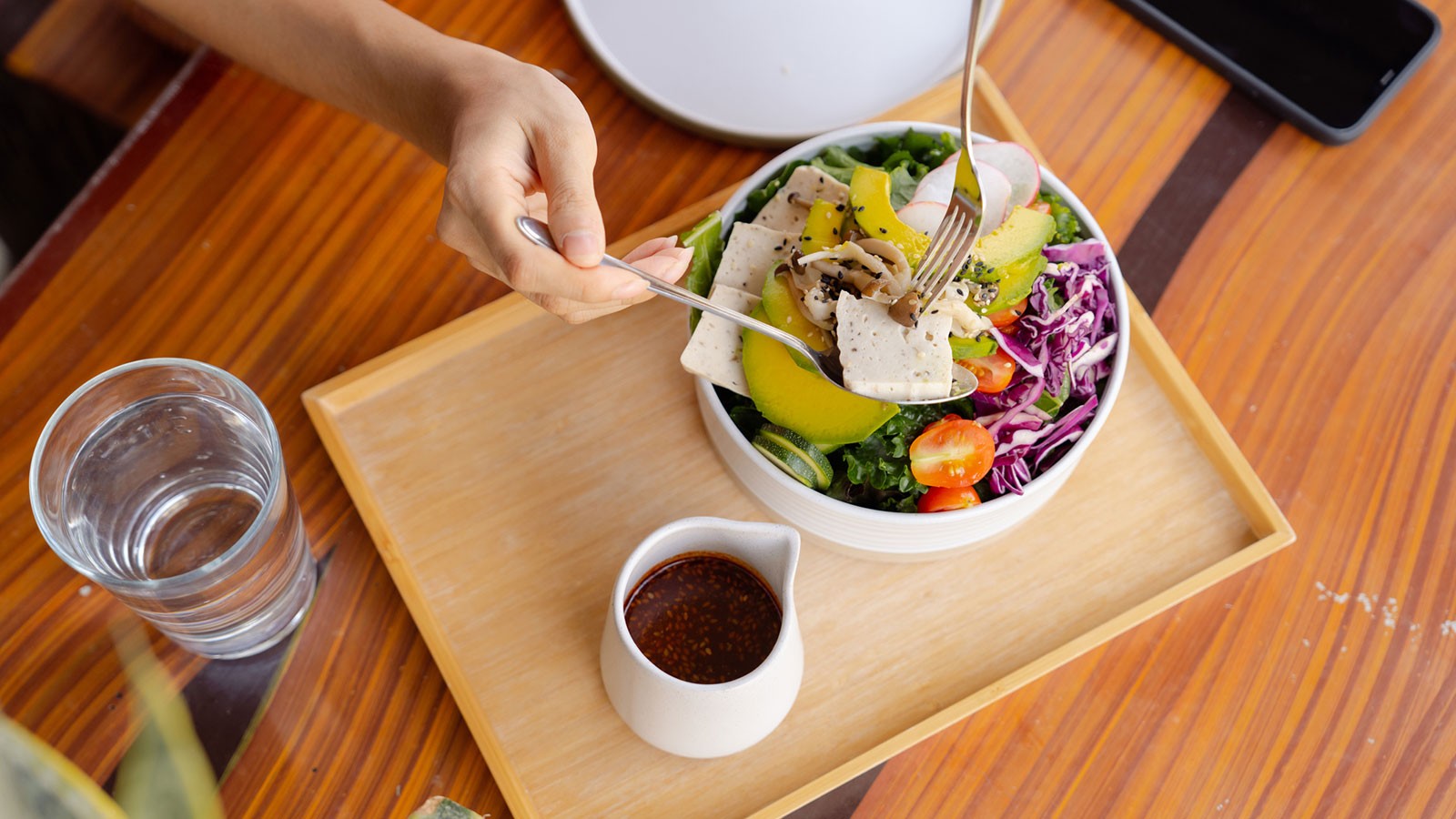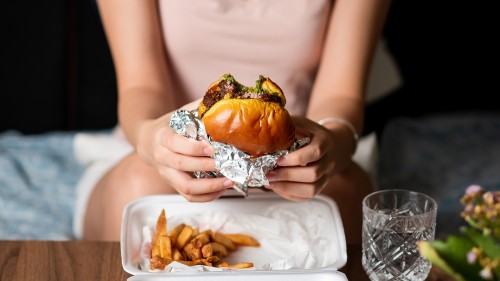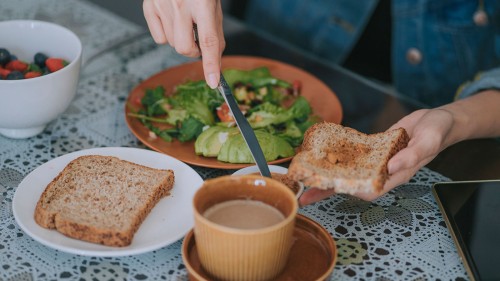Gout Diet: Foods to Avoid, What to Eat Instead, Plus a Meal Plan
Last Updated on September 28, 2023
Medically Reviewed by Natalie Olsen, MS, RDN
Gout is a form of arthritis that affects the joints. Foods high in purines can make gout worse. Limiting certain foods and eating more of others, as well as making other diet and lifestyle changes can help manage gout.


Gout can be a painful condition that is unpleasant to deal with for most people.
Your diet can play a big role in whether you develop gout. It can also strongly influence how severe your gout is if you already have it.
Knowing more about foods to avoid or limit with gout, including high purine foods, can make a big difference in your ability to treat it.
Read on to learn more about how to help manage or prevent your gout.
What Is Gout?
Gout is a type of inflammatory arthritis. (1)
It affects the joints and can be very painful. The big toe is often the first joint to be affected, but it can also affect other toes, knees, and ankles.
Gout symptoms include:
- Intense pain in the affected joint
- Redness
- Swelling
- Heat
What Causes Gout?
Gout is caused by having high levels of uric acid in your body, also called hyperuricemia.
Hyperuricemia can happen when your body cannot properly break down a food compound called purines. When this happens, uric acid crystals can build up in some joints, tissues, and fluids within the body. (2)
However, not everyone who has high uric acid develops gout.
According to the Centers for Disease Control (CDC), some factors make you more likely to develop gout. These include:
- Being overweight or obese.
- Being male.
- Drinking alcohol.
- Taking certain medications, especially diuretics, that cause fluid loss from the body.
- Having certain health conditions, including diabetes, high blood pressure, poor kidney function, and metabolic syndrome.
- Consuming foods and drinks that are high in a type of sugar called fructose.
- Eating a diet high in purines (described more below).
Gout can negatively affect many aspects of daily life. However, there are many ways it can be effectively treated and managed to help improve the quality of your life.
Following a gout diet is one of these ways.
What Is a Gout Diet?
A gout diet is an eating plan used to manage gout. It serves to reduce the amount of purines in the diet and helps reduce high levels of uric acid to prevent new crystals from forming.
These things can help manage gout pain and help prevent it from getting worse.
High purine foods include: (3)
- Red Meat: Like beef, pork, and venison.
- Organ Meats: Like liver.
- Some Fish and Shellfish: Including anchovies, sardines, mussels, trout, mackerel, herring, crab, shrimp, and scallops.
- Chicken: Although it has a lower purine content than red meat.
Legumes like beans and lentils also contain purines. However, plant-based sources of purines do not seem to affect gout the way meat-based sources do. (4)
Following a low-purine diet may help prevent gout attacks.
Other Foods to Limit or Avoid with Gout
In addition to limiting or avoiding foods that are high in purines, there are other foods that can trigger gout.
People with gout may also benefit from limiting or avoiding these foods and beverages. (5)
Alcohol
Some alcoholic beverages, such as beer, are high in purines. However, all types of alcohol can affect the way your kidneys get rid of uric acid in your urine, potentially leading to a buildup. (6)
Sugary Drinks and Foods
Standard table sugar called sucrose, contains half fructose. When the body breaks down fructose, purines are released. (7)
Examples of foods and beverages in this category include:
- Soda
- Sweetened coffee and tea beverages
- Energy drinks
- Fruit juices
- Pastries
- Desserts like cookies, candy, and ice cream
Foods and Drinks with High Fructose Corn Syrup (HFCS)
HFCS contains 55% fructose, which is more than standard table sugar. It can contribute to gout similarly to how other sugary foods can. (8)
Foods that often contain HFCS include:
- Pre-packaged sweets like cupcakes and cookies.
- Condiments like ketchup and barbeque sauce.
- Some fast food menu items.
- Popsicles and other frozen treats.
- Processed breakfast foods like many kinds of cereal, muffins, and pastries.
- Bread and crackers are some foods that you may not think of as being sweet can also contain HFCS.
A diet high in sugar, including sucrose and high fructose corn syrup, may also lead to more inflammation. (9)
Since gout already involves a lot of inflammation, sugar may worsen gout symptoms.
What Are the Best Foods to Treat Gout?
Following a low-purine diet and avoiding high amounts of sugar and alcohol are good ways to manage gout. In addition, consuming other foods and beverages can help manage gout.
Some of the best foods and beverages for treating gout include: (10)
Skim Milk and Yogurt
Research has found an association between consuming dairy products such as milk and yogurt and lower uric acid levels. (11)
It does this by helping remove uric acid from the body via urine.
Coffee
Research shows that drinking coffee may be associated with a lower risk of gout. (12)
It does this by helping to lower uric acid levels in the body in a variety of ways. (13)
Cherries
Data from a large online survey showed that eating cherries over a two-day period was associated with a 35% lower risk of gout attacks. The use of cherry extract lowered the risk by 45%. (14)
Like the other foods, cherries help reduce levels of uric acid.
Water
Drinking enough water can help prevent and manage gout flare-ups by flushing uric acid from the body. Being dehydrated is a risk factor for gout attacks. (15)
Foods High in Vitamin C
Older research found that a higher vitamin C intake was associated with a lower risk of gout. (16)
However, newer research reports that there is not a clear link between a high daily intake of vitamin C and the prevention or management of gout. (17)
Still, vitamin C continues to be recommended by the Arthritis Foundation. (10)
It is a good idea to talk to your doctor about whether or not you should take vitamin C supplements.
Whole Grains
Whole grains like whole wheat bread products, quinoa, and brown rice are all healthy choices that are low in purines.
Vegetables
Most vegetables are low in purines and natural sugars and are also part of a healthy diet for just about anyone.
Sample Gout Meal Plan
Breakfast
- Plain yogurt topped with berries
- A whole-grain piece of toast or English muffin
- 1–2 cups of coffee
Lunch
- Salad made with leafy greens and other vegetables of choice, topped with 3–4 oz of cooked salmon, a sprinkle of nuts, and drizzled with a balsamic vinaigrette
- Water to drink
Snack
- A bowl of cherries and some nuts or skim milk cheese
- Water to drink
Dinner
- 3 oz of roasted chicken breast
- Side of brown rice and broccoli, seasoned with olive oil and herbs or spices of choice
- Water to drink
Tip:
Some research has shown that eating a Mediterranean diet can be helpful in managing gout. (18) This may be because it is a type of anti-inflammatory diet that can help control inflammation.
The Bottom Line
Gout is a type of arthritis that involves inflammation in the joints. It can cause pain and other symptoms and often occurs in the toes, knees, and ankles.
Gout is caused by a buildup of uric acid in the body. Foods high in purines, such as red meat and some seafood, can contribute to this buildup.
Making dietary changes and following a low-purine diet is a good way to help manage gout.
Other foods and beverages, including skim milk, coffee, cherries, and foods high in vitamin C, can help manage or prevent gout.
Lifestyle changes like drinking more water, limiting or avoiding alcohol, achieving a healthy weight, and being physically active can also help with gout.
If you have or are at risk of developing gout, it is always a good idea to talk with a trusted healthcare professional about your unique situation.
At WellnessVerge, we only use reputable sources, including peer-reviewed medical journals and well-respected academic institutions.
- Gout | Arthritis | CDC:
https://www.cdc.gov/arthritis/basics/gout.html - Physiological functions and pathogenic potential of uric acid: A review - PMC:
https://www.ncbi.nlm.nih.gov/pmc/articles/PMC5512149/ - Safe Foods for Gout | Arthritis Foundation:
https://www.arthritis.org/health-wellness/healthy-living/nutrition/healthy-eating/which-foods-are-safe-for-gout - The Association between Purine-Rich Food Intake and Hyperuricemia: A Cross-Sectional Study in Chinese Adult Residents - PMC:
https://www.ncbi.nlm.nih.gov/pmc/articles/PMC7765492/ - Gout (Low Purine) Diet: Best Foods to Eat & What to Avoid:
https://my.clevelandclinic.org/health/treatments/22548-gout-low-purine-diet - The Link Between Alcohol and Gout: Does Drinking Alcohol Affect Gout?:
https://creakyjoints.org/about-arthritis/gout/gout-diet/alcohol-and-gout/#:~:text=Drinking%20alcohol%20affects%20gout%20risk,acid%20is%20eliminated%20in%20urine. - Fructose and Gout: What’s the Link? - Gout:
https://blog.arthritis.org/gout/fructose-sugar-gout/ - Natural and Added Sugars: Two Sides of the Same Coin - Science in the News:
https://sitn.hms.harvard.edu/flash/2015/natural-and-added-sugars-two-sides-of-the-same-coin/ - The sweet danger of sugar - Harvard Health:
https://www.health.harvard.edu/heart-health/the-sweet-danger-of-sugar - Shopping List for Gout:
https://www.arthritis.org/diseases/more-about/shopping-list-for-gout - The association of vitamin C, alcohol, coffee, tea, milk and yogurt with uric acid and gout – Wiley Online Library:
https://onlinelibrary.wiley.com/doi/full/10.1111/1756-185X.12622 - Is coffee consumption associated with a lower risk of hyperuricaemia or gout? A systematic review and meta-analysis - PMC:
https://www.ncbi.nlm.nih.gov/pmc/articles/PMC4947733/ - Epidemiology of Gout - PMC:
https://www.ncbi.nlm.nih.gov/pmc/articles/PMC4119792/ - Is there a role for cherries in the management of gout? - PMC:
https://www.ncbi.nlm.nih.gov/pmc/articles/PMC6535740/#:~:text=In%20a%20large%20case%2Dcrossover,lowered%20the%20risk%20by%2045%25.&text=In%20combination%20with%20allopurinol%2C%20cherry,risk%20reduction%20in%20gout%20flares. - Nonpharmacological Management of Gout and Hyperuricemia: Hints for Better Lifestyle - PMC:
https://www.ncbi.nlm.nih.gov/pmc/articles/PMC6125106/ - Vitamin C Intake and the Risk of Gout in Men – A Prospective Study - PMC:
https://www.ncbi.nlm.nih.gov/pmc/articles/PMC2767211/ - Role of Vitamin C in Prophylaxis and Treatment of Gout—A Literature Review - PMC:
https://www.ncbi.nlm.nih.gov/pmc/articles/PMC7926958/ - The role of the Mediterranean diet in hyperuricemia and gout - PMC:
https://www.ncbi.nlm.nih.gov/pmc/articles/PMC7045958/






